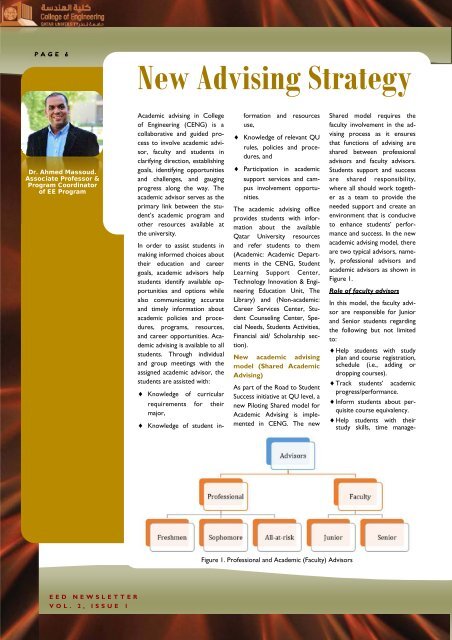EED-Newsletter-Vol-2-Issue-1-2017
Create successful ePaper yourself
Turn your PDF publications into a flip-book with our unique Google optimized e-Paper software.
PAGE 6<br />
New Advising Strategy<br />
Dr. Ahmed Massoud.<br />
Associate Professor &<br />
Program Coordinator<br />
of EE Program<br />
Academic advising in College<br />
of Engineering (CENG) is a<br />
collaborative and guided process<br />
to involve academic advisor,<br />
faculty and students in<br />
clarifying direction, establishing<br />
goals, identifying opportunities<br />
and challenges, and gauging<br />
progress along the way. The<br />
academic advisor serves as the<br />
primary link between the student’s<br />
academic program and<br />
other resources available at<br />
the university.<br />
In order to assist students in<br />
making informed choices about<br />
their education and career<br />
goals, academic advisors help<br />
students identify available opportunities<br />
and options while<br />
also communicating accurate<br />
and timely information about<br />
academic policies and procedures,<br />
programs, resources,<br />
and career opportunities. Academic<br />
advising is available to all<br />
students. Through individual<br />
and group meetings with the<br />
assigned academic advisor, the<br />
students are assisted with:<br />
Knowledge of curricular<br />
requirements for their<br />
major,<br />
Knowledge of student information<br />
and resources<br />
use,<br />
Knowledge of relevant QU<br />
rules, policies and procedures,<br />
and<br />
Participation in academic<br />
support services and campus<br />
involvement opportunities.<br />
The academic advising office<br />
provides students with information<br />
about the available<br />
Qatar University resources<br />
and refer students to them<br />
(Academic: Academic Departments<br />
in the CENG, Student<br />
Learning Support Center,<br />
Technology Innovation & Engineering<br />
Education Unit, The<br />
Library) and (Non-academic:<br />
Career Services Center, Student<br />
Counseling Center, Special<br />
Needs, Students Activities,<br />
Financial aid/ Scholarship section).<br />
New academic advising<br />
model (Shared Academic<br />
Advising)<br />
As part of the Road to Student<br />
Success initiative at QU level, a<br />
new Piloting Shared model for<br />
Academic Advising is implemented<br />
in CENG. The new<br />
Shared model requires the<br />
faculty involvement in the advising<br />
process as it ensures<br />
that functions of advising are<br />
shared between professional<br />
advisors and faculty advisors.<br />
Students support and success<br />
are shared responsibility,<br />
where all should work together<br />
as a team to provide the<br />
needed support and create an<br />
environment that is conducive<br />
to enhance students’ performance<br />
and success. In the new<br />
academic advising model, there<br />
are two typical advisors, namely,<br />
professional advisors and<br />
academic advisors as shown in<br />
Figure 1.<br />
Role of faculty advisors<br />
In this model, the faculty advisor<br />
are responsible for Junior<br />
and Senior students regarding<br />
the following but not limited<br />
to:<br />
Help students with study<br />
plan and course registration,<br />
schedule (i.e., adding or<br />
dropping courses).<br />
Track students’ academic<br />
progress/performance.<br />
Inform students about perquisite<br />
course equivalency.<br />
Help students with their<br />
study skills, time manage-<br />
Figure 1. Professional and Academic (Faculty) Advisors<br />
<strong>EED</strong> NEWSLETTER<br />
VOL. 2, ISSUE 1


